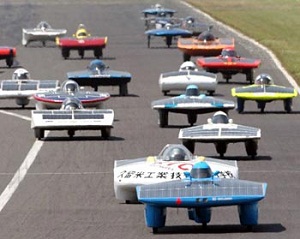Solar race around world underway
 In 1873 French author Jules Verne wrote Around the World in 80 Days in response to the dramatic changes he saw coming from the industrial revolution. In that story, the main character Phileas Fogg accepts a bet that he can’t circumnavigate the globe by rail in 80 days.
In 1873 French author Jules Verne wrote Around the World in 80 Days in response to the dramatic changes he saw coming from the industrial revolution. In that story, the main character Phileas Fogg accepts a bet that he can’t circumnavigate the globe by rail in 80 days.
Today, the measure—80 days to conquer the world—remains the greatest challenge, the greatest benchmark, of success for modes of transport.
Four brave teams took off from the Place Des Nations in Geneva, Switzerland, on Monday to compete in an 80-day race around the globe.
The challenge this time, in 2010, 137 years after Jules Verne set the count as a benchmark, is to make the trip in a car without emitting any Carbon Dioxide at all.
Two small space-ship looking sedans and two scooters are competing.
In order to succeed, the vehicles will have to be able to go 50 mph (unlike the fastest solar car, which goes 90 mph) and travel at least an average of 155 miles a day. And they will have to be able to do it 80 days in a row.
The cars, coming from three different continents, have proven their roadworthiness. As of Wednesday night, all four were in Germany.
All of the cars are electric and operate with different combinations of solar and wind energy.
Louis Palmer, a Swiss man, organized the race.
“We want to show that we have solutions,” Palmer said in a release. “There is climate change. The petrol is coming to an end, everybody knows, but we have the solutions, like electric cars, renewable energy, that's what we want to show to the people all over in the world. It runs, it works."
Palmer knows firsthand that the race he created is realistic. He took a trip around the world in his own solar vehicle in 2008. He called his around-the-world project the Solartaxi.
Now, the Zero race will emphasize the point he tried to make on his own.
The tour is expected to finish in Geneva next January.



